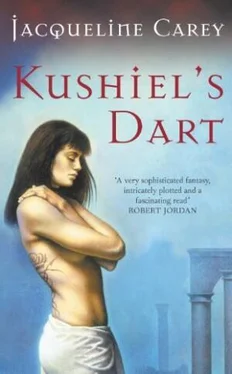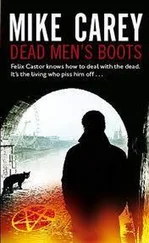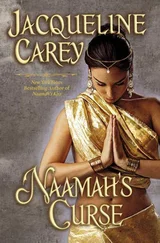So began the years of my long apprenticeship with Anafiel Delaunay, wherein I began to learn how to look and see and think. And lest anyone should suppose that my time was taken with nothing more taxing than watching and heeding my surroundings, I may assure you, this was the least of it, if not the least important.
As Delaunay had indicated, I studied languages; Caerdicci, until I could speak it in my dreams, and Cruithne (for which I saw no need) and Skaldic, recalling to me the long-ago tribesman who had appointed himself my guardian on the Trader’s Road. Alcuin, it transpired, spoke Skaldic with some long-imprinted skill, for it had been his milk-tongue, spoken to him in the cradle by a Skaldic wetnurse. In truth, it was she who had saved him from an ambush by her own people and given him unto Delaunay’s keeping, but this I learned later.
In addition to languages, we were made to study history, until my head ached with it. We traced civilization from the golden age of Hellas to the rise of Tiberium, and followed her fall, dealt two-fisted by twin claimants. The followers of Yeshua held that his coming was a prophecy, that Tiberium should fall and they should restore the throne of the One God; historians, Delaunay told us guardedly, held that the dispersal of Yeshuite financiers from the city of Tiberium had more to do with it. Strained coffers, he maintained, were what eventually caused the great empire of Tiberium to be divided into the loose-knit republic of nation-states that comprises Caerdicca Unitas.
The second blow, no less doughty, was struck against the once-mighty Tiberian armies on the green island of Alba, when there arose amid the warring factions a tribal king named Cinhil ap Domnall, known as Cinhil Ru, who succeeded in making a treaty with the Dalriada of Eire and uniting the tribes against the Emperor’s armies. Thus did the island come once and for all under the rule of the Cruithne, whom scholars call the Picti. They are a wild, half-civilized folk, and I saw no need to learn their tongue.
Once the Tiberian soldiers were driven out of Alba, they began retreating and never stopped, driven out of the Skaldic hinterlands by berserkers and-legends claimed-the spirits of raven and wolf.
Through this bloodstained tapestry ran the history of Terre d’Ange, shining like a golden thread. A peaceful land content to fruit and flower beneath the blessed sun, we had no history, Delaunay said, before the coming of Elua. We gave way with grace before the armies of Tiberium, who ate our grapes and olives, wed our women and held our borders against the Skaldi. We carried out our small rituals unchanged, and kept our language and our songs, unchanging. When the armies of Tiberium retreated like a wave across our lands, into the waiting emptiness came the wandering steps of Elua, and the land welcomed him like a bridegroom.
Thus was born Terre d’Ange, and thus did we acquire history and pride. In the three-score Years of Elua, the Companions dispersed, placing their numinous stamp on the land and its people. Blessed Elua himself claimed no portion, but delighted to roam at will, a wandering bridegroom in love with all that he saw. When he tarried, it was in the City, which is why she is the queen of all cities, and beloved in the nation; but he tarried seldom.
All this I knew, and yet it was a different thing, to learn it from Delaunay: not stories, but histories. For this too I learned, that a storyteller’s tale may end, but history goes on always. These events, so distant in legend, play a part in shaping the very events we witness about us, each and every day. When I understood this, Delaunay said, I might begin to understand.
What I was to understand, it seemed, was everything. It was not until I began to study the labyrinthine maze of court politics that I truly despaired of my sheltered life in the Night Court. Alcuin had been learning such things for two years and more, and could effortlessly recite the lineage of each of the seven sovereign duchies, the royal family and its myriad entanglements, the duties of the Exchequer, the limits of judiciary powers, even the by-laws of the Guild of Spice-Trading.
For this, as for so much else, I despised him; and yet I admit freely that I loved him, too. It was impossible not to love Alcuin, who loved nigh the entire world. Unlikely as it seemed to one raised in the Night Court, he was unaware of his startling beauty, which only increased as he got older. He had a quicksilver mind and a prodigious memory, which I envied, and yet he took no pride in it save the pride of pleasing Delaunay.
When Delaunay entertained, which in those days was often, it was Alcuin who waited on his guests. In contrast to the revels and delights staged by Cereus House, these were civilized, erudite affairs. What Delaunay liked best was to invite a small number of friends, who would recline on couches a la Hellene in the inner courtyard, enjoying an elegant meal and spinning out the night in convivial conversation.
Alcuin stood by to serve wine or cordial at these affairs, and while I was contemptuous of his lack of sophistication, I could not deny that he was a charming sight, all untutored grace and gentle eagerness, the vine-cast shadows throwing traceries of green on his moon-white hair. When Alcuin proffered the wine-jug with his grave smile, as like as not guests smiled back and raised their glasses, whether they wished them refilled or no, merely to see the pleasure of serving light his dark eyes.
This, of course, was Delaunay’s intent, and I’ve no doubt that many a tongue was loosened in that courtyard by virtue of Alcuin’s smile. I have never known a mind more subtle than that of Anafiel Delaunay. Yet to those who cite such things as proof that he used us without regard, I say: It is a lie. Of a surety, we loved him, both of us in our differing ways, and I have no doubt in my mind that Delaunay loved us in turn. I would have proof enough of that ere things were done, little though I welcomed it at the time.
As for the guests, they varied, and so widely it scarce seemed possible that one man could have so many acquaintances from such far-flung quarters of the nation. He chose his guests with great care, and never did I see a mix that soured, unless it was at his will. Delaunay knew court officials and judiciaries, lords and ladies, shippers and traders, poets and painters and moneylenders. He knew singers and warriors and goldsmiths, breeders of the finest horseflesh, scholars and historians, silk merchants and milliners. He knew scions of Blessed Elua and his Companions, and members of all the Great Houses.
I learned that Gaspar Trevalion, Comte de Fourcay and kinsman to Marc, Duc de Trevalion, was a great friend of his. A clever, cynical man with streaks of grey at his temples, Gaspar was adept at sniffing the political winds to see which way they blew. It was he, doubtless, who had told Delaunay how the Princess Lyonette whispered in her son Baudoin’s ear about an ailing King and an empty throne, and the portent people might take from the symbolic wedding at the Midwinter Masque.
Such things surrounded me and were a part of my life on a daily basis, for what I did not observe, I later learned when Delaunay obtained Alcuin’s recitation of a night’s events. He was ever scrupulous in including me during these sessions, that I might increase the knowledge that already crammed my aching skull. For a long time, I resented his favoritism of Alcuin, when I was better-trained to serve; but even so, I listened.
I understood, later, why he held me back during those first long years. Those whom Delaunay would choose for his clientele would be chosen with care. They were among the elite and mistrustful of the nation, too deeply embroiled in money and power to be lured easily into spilling pillow-secrets. With Alcuin, Delaunay was wise enough to set the wheels of desire in motion long before the day would arrive. There were nobles who yearned for years, watching him grow with tantalizing slowness from a beautiful child to a breathtaking youth. When they spilled their secrets, there were years of pressure behind the force that burst the dam.
Читать дальше












